|
|
|
Sort Order |
|
|
|
Items / Page
|
|
|
|
|
|
|
| Srl | Item |
| 1 |
ID:
190052
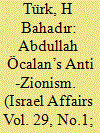

|
|
|
|
|
| Summary/Abstract |
Anti-Zionism has been a salient component of rightwing and leftwing movements in Turkey. The Kurdistan Workers’ Party (Partiya Karkerên Kurdistan, PKK) that took its cue from the Turkish Left has become a topic of discussion since its founding in 1978. Yet little effort has been devoted to analysing the political thought of the PKK’s leader, Abdullah Öcalan. Using an interpretative-textual method, this article seeks to fill this lacuna by discussing the role of anti-Zionism in Öcalan’s thought.
|
|
|
|
|
|
|
|
|
|
|
|
|
|
|
|
| 2 |
ID:
145630


|
|
|
|
|
| Summary/Abstract |
This article aims to analyze the dynamics of the party system in Turkey by focusing on the AKP and construct an aggregate-level analysis of the electoral environment it operates in using regression models (1950–2011). Findings show strong patterns of continuity in the electoral geography of Turkey since the 1970s, mapping electoral strongholds of center-right, ultra-nationalist and pro-Islamist parties compared to those of the AKP. As of 2015, the AKP seems to have achieved a great deal of stabilization electorally and there is now handful of data that can identify and answer some of the questions related to the AKP, especially regarding its ideology, origins, electoral strength and appeal.
|
|
|
|
|
|
|
|
|
|
|
|
|
|
|
|
| 3 |
ID:
145643
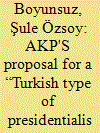

|
|
|
|
|
| Summary/Abstract |
President Recep T. Erdoğan and the Justice and Development Party have proposed a presidential system with a very strong single executive with very little or no constitutional constraints, called “the Turkish Type of Presidential System.” They campaigned for it from 2013 through the 2015 parliamentary election. Even though this proposal has not been enacted, it has shaped Turkish politics considerably by generating strong opposition as well as stalwart defenders. This article examines the constitutional institutions of the proposed presidential model, compares it with other known examples of presidential systems, and argues that it is a form of hyper-presidentialism.
|
|
|
|
|
|
|
|
|
|
|
|
|
|
|
|
| 4 |
ID:
129563
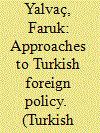

|
|
|
|
|
| Publication |
2014.
|
| Summary/Abstract |
This article analyses different approaches to Turkish foreign policy (TFP) from a critical realist perspective. It seeks to criticize positivist and post-positivist approaches to TFP, arguing for a non-reductionist, historical materialist approach based on the principles of critical realism. It argues that historical materialist approaches are missing both from the analysis of TFP and from the mainstream foreign-policy analysis in general. In emphasizing the importance of a historical materialist approach, the paper also underlines the importance of acknowledging the structural context of foreign policy-making as a complement to the agent-centric, micro-level analyses that dominate the mainstream TFP analysis. Finally, it advocates a research agenda that focuses on the development of a historical materialist approach to TFP.
|
|
|
|
|
|
|
|
|
|
|
|
|
|
|
|
| 5 |
ID:
187045
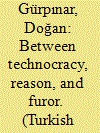

|
|
|
|
|
| Summary/Abstract |
This article aims to demonstrate the tension inherent within the Turkish opposition between those favoring technocratic anti-populism and/or pragmatic politics and those calling for a passionate and resolute anti-AKP platform seeking revenge. These competing inclinations offer alternate anti-populist platforms and ‘styles.’ The article asks whehter opposition to a populist regime inherently generates an anti-populist platform that ideologically confronts it. The article examines three contenders to President Erdoğan as representatives of three alternative anti-populist styles. It also reflects on the debates among various public intellectuals around the ways to electorally defeat populism.
|
|
|
|
|
|
|
|
|
|
|
|
|
|
|
|
| 6 |
ID:
156093
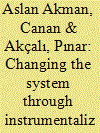

|
|
|
|
|
| Summary/Abstract |
Since the 1990s, debates on a constitutional system reform in Turkey have ignited controversies over the executive structure of its parliamentary system. This article looks at the debate in terms of the interaction between institutional dynamics and politicians’ choices, shaped by past institutional transformations following transitions. It is contended that institutional weaknesses underlying both the presidency and executive–legislative relations in Turkey have provided strong incentives for incumbent elites to challenge existing parliamentary norms and advocate presidential alternatives. Far from contributing to a sober diagnosis of the problems of parliamentarism, the recent constitutional amendment introducing a system of executive presidency has further divided Turkey’s already polarized political and civil society.
|
|
|
|
|
|
|
|
|
|
|
|
|
|
|
|
| 7 |
ID:
095389
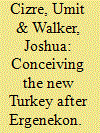

|
|
|
|
|
| Publication |
2010.
|
| Summary/Abstract |
In Turkey, a politically autonomous and secular military is pitted against a popularly elected, Islamic-rooted government, which has acquired new energy for domestic and foreign policy agendas and political reform. The election of Barack Obama and the Democrats in the US, as well as reverberations from the ongoing Ergenekon revelations and attempts to address the Kurdish question have brought new influences and players into the game of domestic Turkish politics. This article analyses the possible impact of these changes domestically, as well as from the EU and US perspectives.
|
|
|
|
|
|
|
|
|
|
|
|
|
|
|
|
| 8 |
ID:
160437
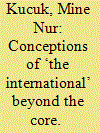

|
|
|
|
|
| Summary/Abstract |
International relations (IR) scholarship rests on a conception of ‘the international’ based on the experiences of core actors. A burgeoning literature has asked what IR would look like if non-core actors’ conceptions of ‘the international’ were also considered. This article analyzes conceptions of ‘the international’ in Turkey as an example of a non-core context. In doing this, the article develops and offers a new analytical framework which breaks down the components of conceptions of ‘the international’ into three questions: ‘what’, ‘who’, and ‘where’ of world politics – namely, the main dynamics of world politics, the main actors of world politics, and the location where world politics takes place. I utilize this framework to empirically analyze the election manifestos and party programs of the political parties in Turkey, and tease out their conceptions of ‘the international.’ The article concludes by considering the implications of these findings for IR scholarship in general.
|
|
|
|
|
|
|
|
|
|
|
|
|
|
|
|
| 9 |
ID:
158734


|
|
|
|
|
| Summary/Abstract |
The results of the 2002 general election in Turkey came as a powerful shock to multifarious circles both within and outside the country. There were deep concerns that the ‘moderate’ Islamic-oriented Justice and Development Party (AKP) might try to dismantle the very bases of the secular state. Fifteen years of AKP rule have displayed four distinctively different periods: (1) Normalization and reinstitution of civil governance (2002–2007); (2) Methodological transition (2007–2009); (3) Consolidation of power-base (2009–2011); and (4) De-secularization, de-democratization, re-securitization and shift to authoritarianism (2011–2016). Drawing upon the ‘competitive authoritarianism’ literature and the concept of ‘instrumentalization of democracy,’ this article will elaborate the above points as well as the intrinsic Islamist mindset of the AKP. Use of foreign policy as an instrument of legitimation of Islamist policies and anti-secular transformation will also be examined.
|
|
|
|
|
|
|
|
|
|
|
|
|
|
|
|
| 10 |
ID:
184202


|
|
|
|
|
| Summary/Abstract |
Militant groups that are in armed conflict with a government often coexist with political parties that have ethnic or ideological connections to them. In this article, we explore the extent to which electoral support received by militant associated opposition parties and nationally incumbent political parties influences subnational variation in militant attacks. We argue, and empirically demonstrate, that militants strategically target localities where the levels of electoral support for the opposition party and the nationally incumbent party are close in an effort to negatively influence the electoral performance of the incumbent party. To illustrate this dynamic we examine subnational data from 1995 to 2015 Turkish legislative elections and attacks organized by the Kurdish militants within the same time period. We also examine the impact of June 2015 legislative elections on militant attacks until the snap elections in November 2015. Our empirical examination shows that militants target localities where electoral support for the governing party and Kurdish opposition party is close. Moreover, increase in violence negatively influences the electoral performance of the governing party. However, it does not consistently have a significant influence on the opposition. The findings illustrate that militants strategically choose the location of their attacks based on electoral dynamics, and attacks can pose an electoral challenge to the governing party.
|
|
|
|
|
|
|
|
|
|
|
|
|
|
|
|
| 11 |
ID:
158098


|
|
|
|
|
| Summary/Abstract |
Existing research on the relationship between political trust and political participation has generated mixed results. In pursuit of a better explanation of this relationship, we argue that trust in institutions has varying effects on participation for minority and majority groups. In this paper, we analyze Turkish and minority attitudes toward Turkish institutions. We find strong support that trust in institutions affects majority and minority political participation differently. These results highlight the divergent processes at work in the relationships between political trust and political participation across majority and minority citizens in Turkey due to their varied experiences with these institutions. Some of our most interesting findings show that minorities, unlike citizens from the majority group who have higher trust in police, are more likely to protest, and minorities with trust in political parties are actually less likely to join these parties. We explain these surprising findings within the context of Turkey’s post-armed conflict political context.
|
|
|
|
|
|
|
|
|
|
|
|
|
|
|
|
| 12 |
ID:
175138
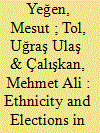

|
|
|
|
|
| Summary/Abstract |
Relying on a survey conducted in 2014 in 12 provinces in eastern Turkey, this article analyses the extent to which (a) ethnicity and religiosity shape Kurds’ electoral choices and (b) the Kurds in the East support the demand for education in Kurdish and the demand for self-rule for Kurds. The findings demonstrate that ethnicity is an important factor in shaping Kurds’ electoral choices and that the demands for education in Kurdish language and self-rule are backed not only by the vast majority of those Kurds who support the pro-Kurdish party but also by a significant number of those Kurds who support the AK Party.
|
|
|
|
|
|
|
|
|
|
|
|
|
|
|
|
| 13 |
ID:
154239
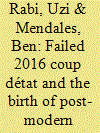

|
|
|
| 14 |
ID:
173142


|
|
|
|
|
| Summary/Abstract |
For most of the first decade of its rule, the AKP touted itself as an agent for democratization, receiving much support both inside and outside of Turkey. More recently, the AKP has taken a clear authoritarian turn, raising the issue of why many observers of Turkey, including myself, did not see this coming. This paper looks at some of the blinders that I, among others, wore as we assessed the AKP and prospects for democracy in Turkey. These included excessive faith in the European Union as an external force for democracy, a belief that the military and militant secularism were the primary obstacles to Turkish democracy, confidence that what the AKP represented was an archetype of an Islamic-oriented party that had been ‘moderated’ by political inclusion and its own ‘learning,’ and a belief in the democratic promise of modernization theory. The article’s objective is to open up a wider discussion of lessons learned from the AKP’s years in power and how scholars may wish to revise some of their assumptions about Turkey as well as the broader literature on democratization.
|
|
|
|
|
|
|
|
|
|
|
|
|
|
|
|
| 15 |
ID:
114239
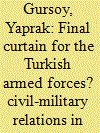

|
|
|
|
|
| Publication |
2012.
|
| Summary/Abstract |
After providing a brief overview of civil-military relations in Turkey prior to the June 12, 2011, general elections, this article focuses on the way in which the ruling Adalet ve Kalkinma Partisi (AKP), the opposition Cumhuriyet Halk Partisi (CHP), and the Milliyetçi Hareket Partisi treated this issue in their election campaigns. It argues that the AKP had a dual discourse on civil-military relations and the CHP occasionally showed signs of defending the role of the military in Turkish politics. However, both the victorious AKP and the main opposition CHP adopted policies that accentuated the reduction of the military's role in politics. An analysis of the election campaigns and results suggests that until the next elections, civilian control over the military will further increase.
|
|
|
|
|
|
|
|
|
|
|
|
|
|
|
|
| 16 |
ID:
145638


|
|
|
|
|
| Summary/Abstract |
Turkish politics is complex and, at times, comes close to being bizarre. When the Justice and Development Party (Adalet ve Kalkınma Partisi [AKP]) came to power it embarked on ambitious economic and political reforms that at last promised to bring embedded democracy to Turkey. Yet, since 2007, most of the initial reforms have regressed, deepening societal cleavages that threaten the stability of the country, and a popularly elected president threatens to change the parliamentary democratic system with an autocratic presidential order. While the AKP can celebrate in its unprecedented four election victories since 2002, its recent actions should give concern to anyone who cares about the future of Turkey.
|
|
|
|
|
|
|
|
|
|
|
|
|
|
|
|
| 17 |
ID:
156094
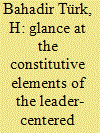

|
|
|
|
|
| Summary/Abstract |
Leadership is a major aspect of Turkish politics; leaders in Turkish politics are regarded as either almost sacred figures or the ultimate reason for all political, social and economic problems. Leaders are seen as decision makers who have a significant impact on almost all aspects of life. It can be contended that a historical continuance toward the leader-centered perspective is present in Turkish politics. This paper aims to present a descriptive framework outlining the elements that constitute the leader-centered perspective in Turkish politics. To accomplish this goal, the paper presents two major arguments. It is argued that the constitutive elements of the leader-centered perspective in Turkish politics are a sui generis synthesis of patrimonialism, patriarchy, populism and militarism. Furthermore, this fourfold historical structure strengthens forms of charismatic leadership and can provide insight into the central role of leadership in Turkish politics.
|
|
|
|
|
|
|
|
|
|
|
|
|
|
|
|
| 18 |
ID:
129562
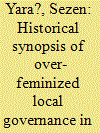

|
|
|
|
|
| Publication |
2014.
|
| Summary/Abstract |
In Turkey, important decentralization measures were taken after the 1980s. The new administrative model gave local governments the role of dealing with social exclusion while financing social welfare expenditures through entrepreneurial investment of their non-material resources. This study is an attempt to discuss how such a challenge for local governments has been resolved through the analysis of gendering impacts of three decentralization reform programs.
|
|
|
|
|
|
|
|
|
|
|
|
|
|
|
|
| 19 |
ID:
173199
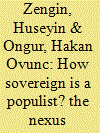

|
|
|
|
|
| Summary/Abstract |
This article investigates the effects of populist discourse on leadership and state behavior at the international level. From 2002 to 2013, Turkey’s Justice and Development Party (AKP) gradually consolidated its power, largely by deploying populist discourses and actions. However, after the party faced a number of challenges, including the Gezi protests, corruption allegations, and a failed coup, its populist rhetoric did not only begin to weaken but also seems to have created a problem of path dependency, which limited the decision-making capability at the hands of its leadership. By comparing the 2001–2002 and 2018–2019 economic crises based on the most-likely case research design, we assert that the AKP’s discursive turn into anti-Western and anti-establishment politics pushed the party into a corner, making it less likely to collaborate with international organizations, such as the IMF and even private consulting companies despite the country’s high inflation rates and currency depreciation.
|
|
|
|
|
|
|
|
|
|
|
|
|
|
|
|
| 20 |
ID:
154930


|
|
|
|
|
| Summary/Abstract |
Turkey’s current slide to authoritarianism creates a puzzle for democratization theory, as it challenges the commonly accepted relationship between wealth and democracy. There is a large consensus in the democratization literature that a robust civil society, a growing middle class, and high GDP per capita create a conducive environment for an authoritarian country to democratize and make it harder for democratic countries to turn authoritarian. Prominent scholars of Turkish politics used these arguments when conceptualizing Turkey’s liberalization and the checkered democratization process in the post-1980 period. Yet, despite positive economic growth, a flourishing civil society, and a rising middle class, Turkey drifted toward a competitive authoritarian regime during the past five years. The article addresses this puzzle and discusses how the Justice and Development Party (Adalet ve Kalkınma Partisi, AKP) co-opted Islamic civil society organizations and attached conservative businessmen to the state through crony-relations, thereby stripping these societal forces from their democratizing qualities.
|
|
|
|
|
|
|
|
|
|
|
|
|
|
|
|
|
|
|
|
|